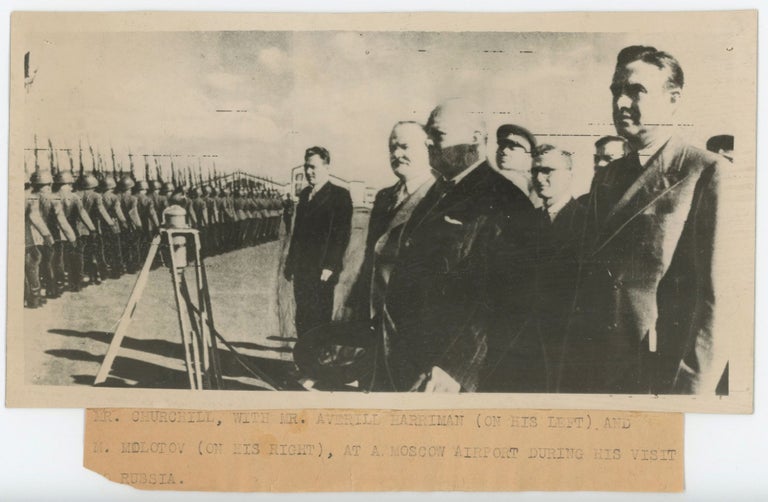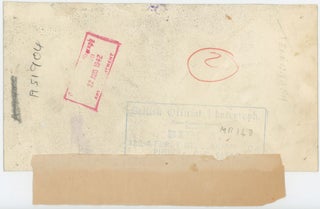An original wartime press photograph of Prime Minister Winston S. Churchill, U.S. Presidential Envoy Averell Harriman, and Soviet Foreign Affairs Minister Vyacheslav Molotov in Moscow on 12 August 1942
London: British Official Photograph, Crown Copyright Reserved, supplied by BIPPA, published by The Daily Telegraph, 22 August 1942. Photograph. This original press photograph captures Prime Minister Winston S. Churchill in Moscow with U.S. Presidential Envoy Averell Harriman and Soviet Foreign Affairs Minister Vyacheslav Molotov in Moscow on 12 August 1942. The gelatin silver print on matte photo paper measures 4.25 x 8 inches (10.8 x 20.3 cm) with an original typed paper caption extending an additional inch below the photo. Condition is very good. The paper is clean, crisp and free of scratches with some light wear to the edges, three pin holes each along the top and bottom edges, and light rippling to the attached caption. Deficiencies of clarity and depth doubtless owe to contemporary limitations of wire transmission from Moscow. The verso bears a copyright stamp reading “British Official Photograph Crown Copyright Reserved supplied by Bippa” and a stamp of The Daily Telegraph dated 22 AUG 1942. The typed caption below the recto reads “MR. CHURCHILL, WITH MR. AVERILL (sic) (ON HIS LEFT), AND M. MOLOTOV (ON HIS RIGHT), AT A MOSCOW AIRPORT DURING HIS VISIT TO RUSSIA.”
The summer months of 1942 represented a critical turning point in the war for the Allied forces in North Africa. At the Second Washington Conference of 19-25 June Churchill and Roosevelt laid the groundwork for Operation Torch, the Allied amphibious landing in French North Africa that would occur in November. In July British troops defeated Rommel’s forces in the First Battle of El Alamein, a victory that would be followed by the decisive Second Battle of Alamein in late October. But in July, Allied progress had stalled and Churchill decided to visit the North African front to assess command there.
Two days before his departure a message from Stalin was received requesting a visit. On 1 August Churchill left for Cairo and spent some time appraising and changing command; on 8 August Alexander was brought in to replace General Auchinleck as Commander-in-Chief, Middle East, and Montgomery was brought in to command the British Eighth Army. Churchill left North Africa shortly after midnight on 10 August for a front of a different sort - his Second Moscow Conference with Stalin. “He flew from Cairo to Tehran in the company of Averell Harriman, whose advice he wanted on how to deal with Stalin.” In his Second World War memoirs he would later recall, “I pondered on my mission to this sullen sinister Bolshevik State I had once tried so hard to strangle at its birth, and which, until Hitler appeared, I had regarded as the mortal foe of civilised freedom.” (Vol. 4, p.428)
This photograph was likely taken on 12 August, the day when Churchill’s Liberator landed in Moscow after a ten-and-a-half-hour flight. “Churchill’s first duty on Soviet soil was to inspect a Red Army guard of honour, and then, together with Averell Harriman, to take a march past.” (Gilbert, Vol.VII, p.173) Churchill was greeted upon arrival by Vyacheslav Molotov, the Soviet Foreign Minister who had signed the Molotov-Ribbentrop Pact on 23 August 1939 promising mutual non-aggression with Nazi Germany. The conference was predictably challenging. Stalin was characteristically moody, demanding, and insulting. Churchill was firm but diplomatic and accommodating. The conference was an exercise in balancing Russia’s need for aid against the British need for the Russians to keep fighting. Stalin continued to want an Allied second front in France. Churchill had the unenviable task of telling that Allied force would be, in the short term, focused in the Mediterranean. As it had since Germany invaded Russia in June 1941, the aligned exigencies of self-preservation held the tenuous alliance. The wake of Germany’s defeat and the replacement of Nazi territorial ambitions with those of Soviet Russia would usher a less bloody but far more lasting and perilous Cold War. Stalin would remain in control of the Soviet Empire – for such it became after the German defeat – until his death in 1953, during Churchill’s second and final premiership. Item #005621
Price: $300.00


